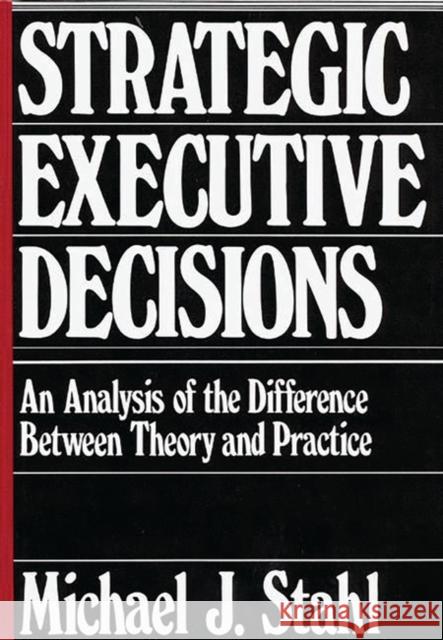Strategic Executive Decisions: An Analysis of the Difference Between Theory and Practice » książka
Strategic Executive Decisions: An Analysis of the Difference Between Theory and Practice
ISBN-13: 9780899303161 / Angielski / Twarda / 1989 / 197 str.
Strategic Executive Decisions: An Analysis of the Difference Between Theory and Practice
ISBN-13: 9780899303161 / Angielski / Twarda / 1989 / 197 str.
(netto: 267,85 VAT: 5%)
Najniższa cena z 30 dni: 279,51
ok. 30 dni roboczych
Dostawa w 2026 r.
Darmowa dostawa!
This book examines strategic executive decision-making. Using data collected over a seven-year period, the author describes how some 1,500 executives actually do make strategic decisions--and how reality differs substantially from theories about executive decision-making. The author identifies and explains the limitations of much of the current research in strategic decision-making. He then offers a rigorous alternative that reflects what actually happens when executives grapple with strategic decisions involving joint ventures, market entry, diversification, acquisitions, project selection, and long-term goals.
"Management Review"
This groundbreaking contribution to business literature examines executive decisionmaking behavior concerning corporate and competitive business strategy. In contrast to previous studies, Strategic Executive Decisions does not offer a prescription for executive decisionmaking. Rather, with the help of extensive data collected over a seven-year period, Stahl describes how some 1500 executives actually do make strategic decisions from the executives' self reports of their own priorities, showing how reality differs substantially from existing theories widely used to explain executive decisionmaking behavior. Required reading for students of management and finance, this book offers an important new methodological alternative to existing theoretical explanations of executive decisionmaking behavior.
Based on the observed difference between theory and actual practice, Stahl identifies and explains the limitations of much of the current research in strategic decisionmaking. He goes on to offer a methodologically rigorous alternative that more closely reflects what actually happens when executives grapple with key decisions involving joint ventures, market entry, diversification, acquisitions, project selection, and long-term strategic goals. The bulk of the study is devoted to a detailed analysis of executive decisionmaking in practice. Stahl shows that the only reliable means of determining how strategic decisions are made is unbiased observation of several decisions followed by calculation of what is really important to the decisionmaker. Questionnaires or interviews with the executives, Stahl demonstrates, will often produce misleading information about how a particular decision was made.











